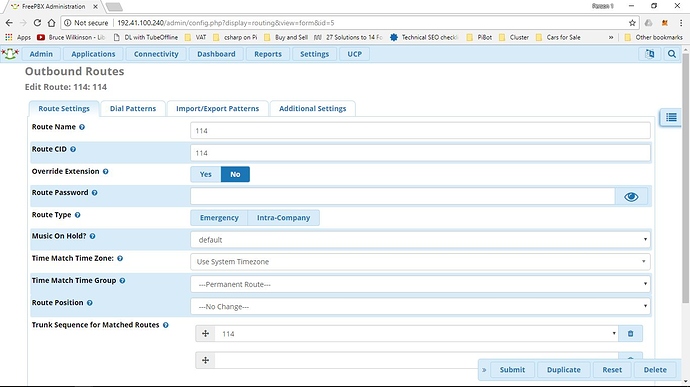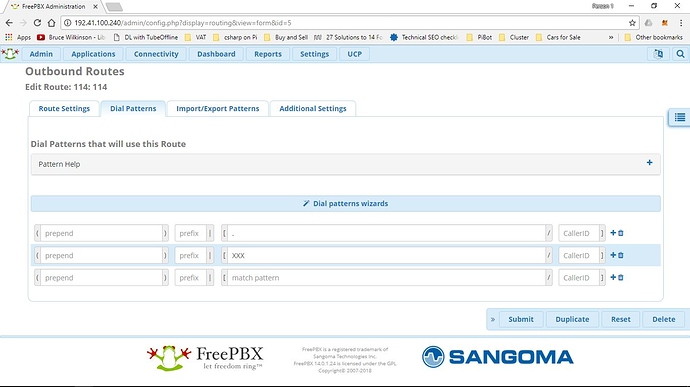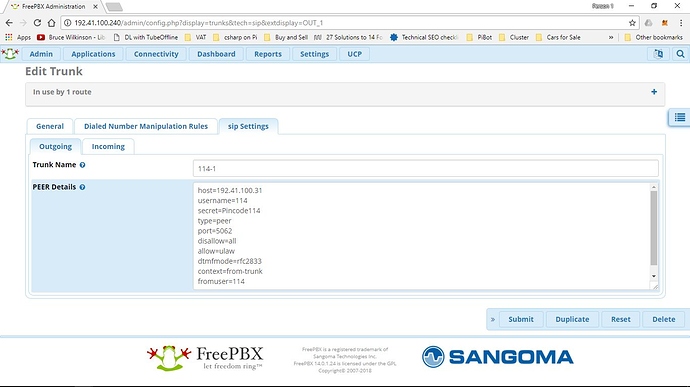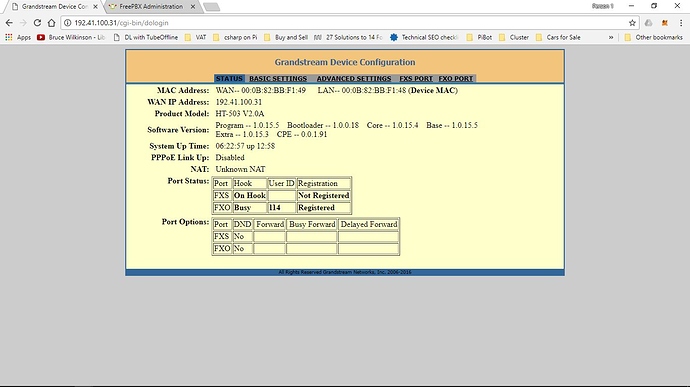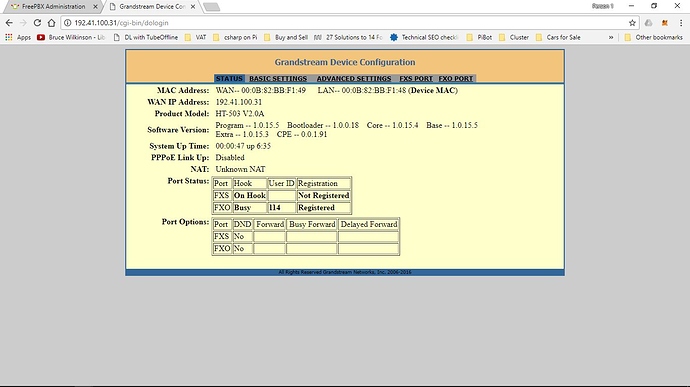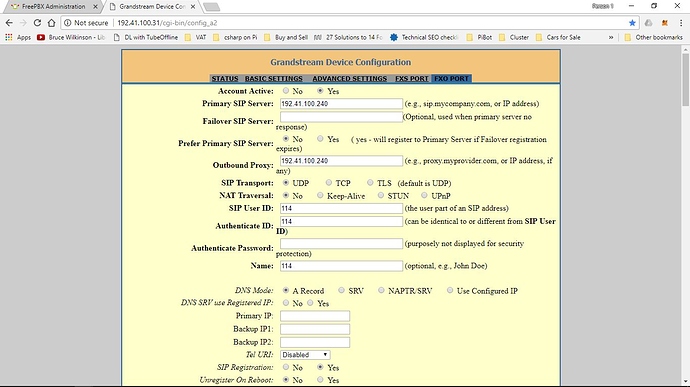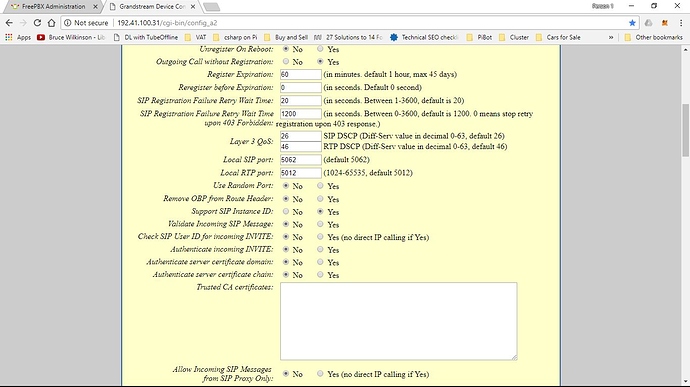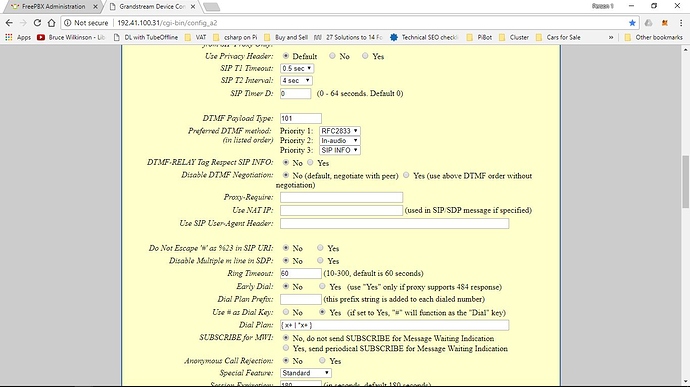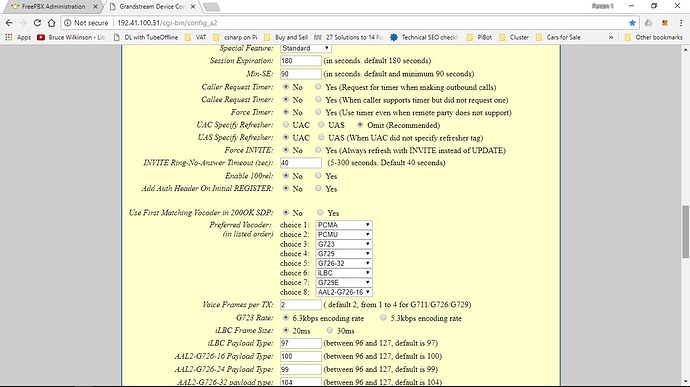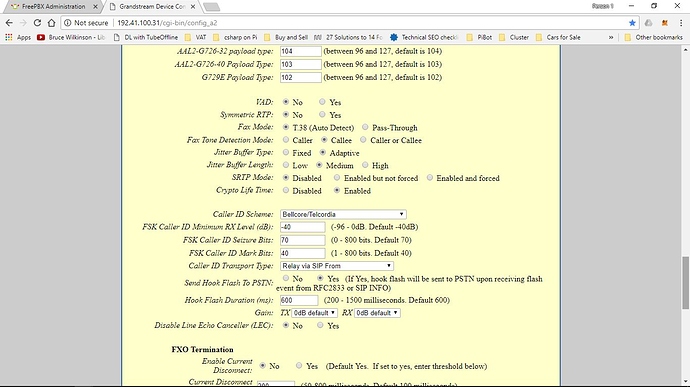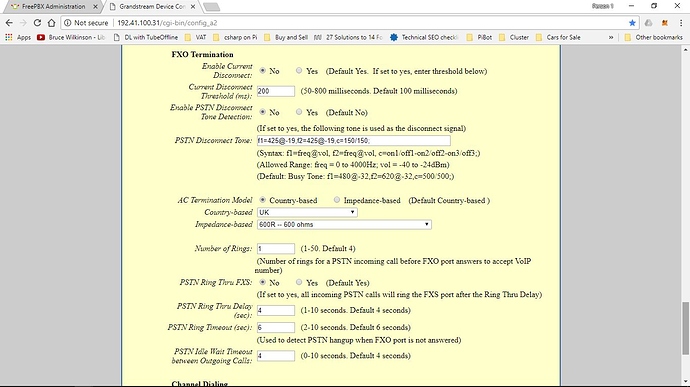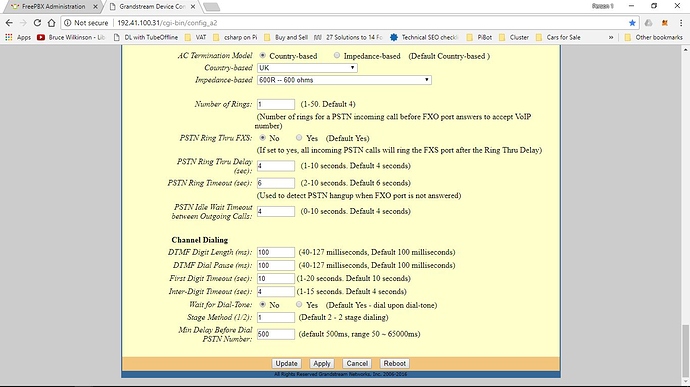Hi,
That 197.184.153.199 IP address you see, is that of my laptop’s ISP. My laptop connects into the LAN via VPN and has Linphone installed.
But on the inside on the LAN, the FXO’s IP address is 192.41.100.31 and FreePBX on 192.41.100.240. There is no firewall between those two. And, my laptop can call one of the Polycom SIP phones on 192.41.100.160, without a problem.
The HT503 shows Busy
When I plug a phone into that line, I get a dial tone and I can phone 102, though the dial tone isn’t exactly the same as a normal POTS line’s dial tone. I’m not sure if that plays a role?
Here’s the debug log while making a call to 102:
== Setting global variable ‘SIPDOMAIN’ to ‘192.41.100.240’
== Setting global variable ‘SIPDOMAIN’ to ‘192.41.100.240’
== Setting global variable ‘SIPDOMAIN’ to ‘192.41.100.240’
– Executing [102@from-internal:1] Macro(“PJSIP/114-0000016e”, “user-callerid,LIMIT,EXTERNAL,”) in new stack
– Executing [s@macro-user-callerid:1] Set(“PJSIP/114-0000016e”, “TOUCH_MONITOR=1523853069.431”) in new stack
– Executing [s@macro-user-callerid:2] Set(“PJSIP/114-0000016e”, “AMPUSER=114”) in new stack
– Executing [s@macro-user-callerid:3] GotoIf(“PJSIP/114-0000016e”, “0?report”) in new stack
– Executing [s@macro-user-callerid:4] ExecIf(“PJSIP/114-0000016e”, “1?Set(REALCALLERIDNUM=114)”) in new stack
– Executing [s@macro-user-callerid:5] Set(“PJSIP/114-0000016e”, “AMPUSER=114”) in new stack
– Executing [s@macro-user-callerid:6] GotoIf(“PJSIP/114-0000016e”, “0?limit”) in new stack
– Executing [s@macro-user-callerid:7] Set(“PJSIP/114-0000016e”, “AMPUSERCIDNAME=Mariska”) in new stack
– Executing [s@macro-user-callerid:8] ExecIf(“PJSIP/114-0000016e”, “0?Set(__CIDMASQUERADING=TRUE)”) in new stack
– Executing [s@macro-user-callerid:9] GotoIf(“PJSIP/114-0000016e”, “0?report”) in new stack
– Executing [s@macro-user-callerid:10] Set(“PJSIP/114-0000016e”, “AMPUSERCID=114”) in new stack
– Executing [s@macro-user-callerid:11] Set(“PJSIP/114-0000016e”, “__DIAL_OPTIONS=HhTtr”) in new stack
– Executing [s@macro-user-callerid:12] Set(“PJSIP/114-0000016e”, “CALLERID(all)=“Mariska” <114>”) in new stack
– Executing [s@macro-user-callerid:13] GotoIf(“PJSIP/114-0000016e”, “0?limit”) in new stack
– Executing [s@macro-user-callerid:14] ExecIf(“PJSIP/114-0000016e”, “1?Set(GROUP(concurrency_limit)=114)”) in new stack
– Executing [s@macro-user-callerid:15] ExecIf(“PJSIP/114-0000016e”, “0?Set(CHANNEL(language)=)”) in new stack
– Executing [s@macro-user-callerid:16] NoOp(“PJSIP/114-0000016e”, “Macro Depth is 1”) in new stack
– Executing [s@macro-user-callerid:17] GotoIf(“PJSIP/114-0000016e”, “1?report2:macroerror”) in new stack
– Goto (macro-user-callerid,s,19)
– Executing [s@macro-user-callerid:19] GotoIf(“PJSIP/114-0000016e”, “1?continue”) in new stack
– Goto (macro-user-callerid,s,37)
– Executing [s@macro-user-callerid:37] Set(“PJSIP/114-0000016e”, “CALLERID(number)=114”) in new stack
– Executing [s@macro-user-callerid:38] Set(“PJSIP/114-0000016e”, “CALLERID(name)=Mariska”) in new stack
– Executing [s@macro-user-callerid:39] GotoIf(“PJSIP/114-0000016e”, “0?cnum”) in new stack
– Executing [s@macro-user-callerid:40] Set(“PJSIP/114-0000016e”, “CDR(cnam)=Mariska”) in new stack
– Executing [s@macro-user-callerid:41] Set(“PJSIP/114-0000016e”, “CDR(cnum)=114”) in new stack
– Executing [s@macro-user-callerid:42] Set(“PJSIP/114-0000016e”, “CHANNEL(language)=en”) in new stack
– Executing [102@from-internal:2] Gosub(“PJSIP/114-0000016e”, “sub-record-check,s,1(out,102,dontcare)”) in new stack
– Executing [s@sub-record-check:1] GotoIf(“PJSIP/114-0000016e”, “0?initialized”) in new stack
– Executing [s@sub-record-check:2] Set(“PJSIP/114-0000016e”, “__REC_STATUS=INITIALIZED”) in new stack
– Executing [s@sub-record-check:3] Set(“PJSIP/114-0000016e”, “NOW=1523853069”) in new stack
– Executing [s@sub-record-check:4] Set(“PJSIP/114-0000016e”, “__DAY=16”) in new stack
– Executing [s@sub-record-check:5] Set(“PJSIP/114-0000016e”, “__MONTH=04”) in new stack
– Executing [s@sub-record-check:6] Set(“PJSIP/114-0000016e”, “__YEAR=2018”) in new stack
– Executing [s@sub-record-check:7] Set(“PJSIP/114-0000016e”, “__TIMESTR=20180416-063109”) in new stack
– Executing [s@sub-record-check:8] Set(“PJSIP/114-0000016e”, “__FROMEXTEN=114”) in new stack
– Executing [s@sub-record-check:9] Set(“PJSIP/114-0000016e”, “__MON_FMT=wav”) in new stack
– Executing [s@sub-record-check:10] NoOp(“PJSIP/114-0000016e”, “Recordings initialized”) in new stack
– Executing [s@sub-record-check:11] ExecIf(“PJSIP/114-0000016e”, “0?Set(ARG3=dontcare)”) in new stack
– Executing [s@sub-record-check:12] Set(“PJSIP/114-0000016e”, “REC_POLICY_MODE_SAVE=”) in new stack
– Executing [s@sub-record-check:13] ExecIf(“PJSIP/114-0000016e”, “0?Set(REC_STATUS=NO)”) in new stack
– Executing [s@sub-record-check:14] GotoIf(“PJSIP/114-0000016e”, “3?checkaction”) in new stack
– Goto (sub-record-check,s,17)
– Executing [s@sub-record-check:17] GotoIf(“PJSIP/114-0000016e”, “1?sub-record-check,out,1”) in new stack
– Goto (sub-record-check,out,1)
– Executing [out@sub-record-check:1] NoOp(“PJSIP/114-0000016e”, “Outbound Recording Check from 114 to 102”) in new stack
– Executing [out@sub-record-check:2] Set(“PJSIP/114-0000016e”, “RECMODE=dontcare”) in new stack
– Executing [out@sub-record-check:3] ExecIf(“PJSIP/114-0000016e”, “1?Goto(routewins)”) in new stack
– Goto (sub-record-check,out,7)
– Executing [out@sub-record-check:7] Gosub(“PJSIP/114-0000016e”, “recordcheck,1(dontcare,out,102)”) in new stack
– Executing [recordcheck@sub-record-check:1] NoOp(“PJSIP/114-0000016e”, “Starting recording check against dontcare”) in new stack
– Executing [recordcheck@sub-record-check:2] Goto(“PJSIP/114-0000016e”, “dontcare”) in new stack
– Goto (sub-record-check,recordcheck,3)
– Executing [recordcheck@sub-record-check:3] Return(“PJSIP/114-0000016e”, “”) in new stack
– Executing [out@sub-record-check:8] Return(“PJSIP/114-0000016e”, “”) in new stack
– Executing [102@from-internal:3] ExecIf(“PJSIP/114-0000016e”, “0 ?Set(CDR(accountcode)=)”) in new stack
– Executing [102@from-internal:4] Set(“PJSIP/114-0000016e”, “MOHCLASS=default”) in new stack
– Executing [102@from-internal:5] ExecIf(“PJSIP/114-0000016e”, “0?Set(TRUNKCIDOVERRIDE=114)”) in new stack
– Executing [102@from-internal:6] Set(“PJSIP/114-0000016e”, “_NODEST=”) in new stack
– Executing [102@from-internal:7] Macro(“PJSIP/114-0000016e”, “dialout-trunk,1,102,off”) in new stack
– Executing [s@macro-dialout-trunk:1] Set(“PJSIP/114-0000016e”, “DIAL_TRUNK=1”) in new stack
– Executing [s@macro-dialout-trunk:2] GosubIf(“PJSIP/114-0000016e”, “0?sub-pincheck,s,1()”) in new stack
– Executing [s@macro-dialout-trunk:3] ExecIf(“PJSIP/114-0000016e”, “0?Set(CALLERID(num)=114)”) in new stack
– Executing [s@macro-dialout-trunk:4] GotoIf(“PJSIP/114-0000016e”, “0?disabletrunk,1”) in new stack
– Executing [s@macro-dialout-trunk:5] Set(“PJSIP/114-0000016e”, “DIAL_NUMBER=102”) in new stack
– Executing [s@macro-dialout-trunk:6] Set(“PJSIP/114-0000016e”, “DIAL_TRUNK_OPTIONS=HhTtr”) in new stack
– Executing [s@macro-dialout-trunk:7] Set(“PJSIP/114-0000016e”, “OUTBOUND_GROUP=OUT_1”) in new stack
– Executing [s@macro-dialout-trunk:8] Set(“PJSIP/114-0000016e”, “DIAL_TRUNK_OPTIONS=T”) in new stack
– Executing [s@macro-dialout-trunk:9] GotoIf(“PJSIP/114-0000016e”, “1?nomax”) in new stack
– Goto (macro-dialout-trunk,s,11)
– Executing [s@macro-dialout-trunk:11] GotoIf(“PJSIP/114-0000016e”, “0?skipoutcid”) in new stack
– Executing [s@macro-dialout-trunk:12] Macro(“PJSIP/114-0000016e”, “outbound-callerid,1”) in new stack
– Executing [s@macro-outbound-callerid:1] NoOp(“PJSIP/114-0000016e”, “114”) in new stack
– Executing [s@macro-outbound-callerid:2] NoOp(“PJSIP/114-0000016e”, “”) in new stack
– Executing [s@macro-outbound-callerid:3] NoOp(“PJSIP/114-0000016e”, “off”) in new stack
– Executing [s@macro-outbound-callerid:4] ExecIf(“PJSIP/114-0000016e”, “0?Set(CALLERPRES(name-pres)=)”) in new stack
– Executing [s@macro-outbound-callerid:5] ExecIf(“PJSIP/114-0000016e”, “0?Set(CALLERPRES(num-pres)=)”) in new stack
– Executing [s@macro-outbound-callerid:6] ExecIf(“PJSIP/114-0000016e”, “0?Set(REALCALLERIDNUM=114)”) in new stack
– Executing [s@macro-outbound-callerid:7] GotoIf(“PJSIP/114-0000016e”, “1?normcid”) in new stack
– Goto (macro-outbound-callerid,s,11)
– Executing [s@macro-outbound-callerid:11] Set(“PJSIP/114-0000016e”, “USEROUTCID=“Mariska” <114>”) in new stack
– Executing [s@macro-outbound-callerid:12] Set(“PJSIP/114-0000016e”, “EMERGENCYCID=”) in new stack
– Executing [s@macro-outbound-callerid:13] Set(“PJSIP/114-0000016e”, “TRUNKOUTCID=114”) in new stack
– Executing [s@macro-outbound-callerid:14] GotoIf(“PJSIP/114-0000016e”, “1?trunkcid”) in new stack
– Goto (macro-outbound-callerid,s,19)
– Executing [s@macro-outbound-callerid:19] ExecIf(“PJSIP/114-0000016e”, “1?Set(CALLERID(all)=114)”) in new stack
– Executing [s@macro-outbound-callerid:20] ExecIf(“PJSIP/114-0000016e”, “1?Set(CALLERID(all)=“Mariska” <114>)”) in new stack
– Executing [s@macro-outbound-callerid:21] ExecIf(“PJSIP/114-0000016e”, “0?Set(CALLERID(all)=)”) in new stack
– Executing [s@macro-outbound-callerid:22] ExecIf(“PJSIP/114-0000016e”, “0?Set(CALLERPRES(name-pres)=prohib_passed_screen)”) in new stack
– Executing [s@macro-outbound-callerid:23] ExecIf(“PJSIP/114-0000016e”, “0?Set(CALLERPRES(num-pres)=prohib_passed_screen)”) in new stack
– Executing [s@macro-outbound-callerid:24] Set(“PJSIP/114-0000016e”, “CDR(outbound_cnum)=114”) in new stack
– Executing [s@macro-outbound-callerid:25] Set(“PJSIP/114-0000016e”, “CDR(outbound_cnam)=Mariska”) in new stack
– Executing [s@macro-dialout-trunk:13] GosubIf(“PJSIP/114-0000016e”, “1?sub-flp-1,s,1()”) in new stack
– Executing [s@sub-flp-1:1] ExecIf(“PJSIP/114-0000016e”, “1?Return()”) in new stack
– Executing [s@macro-dialout-trunk:14] Set(“PJSIP/114-0000016e”, “OUTNUM=102”) in new stack
– Executing [s@macro-dialout-trunk:15] Set(“PJSIP/114-0000016e”, “custom=SIP/114-1”) in new stack
– Executing [s@macro-dialout-trunk:16] ExecIf(“PJSIP/114-0000016e”, “0?Set(DIAL_TRUNK_OPTIONS=M(setmusic^default)T)”) in new stack
– Executing [s@macro-dialout-trunk:17] ExecIf(“PJSIP/114-0000016e”, “0?Set(DIAL_TRUNK_OPTIONS=TM(confirm))”) in new stack
– Executing [s@macro-dialout-trunk:18] Macro(“PJSIP/114-0000016e”, “dialout-trunk-predial-hook,”) in new stack
– Executing [s@macro-dialout-trunk-predial-hook:1] MacroExit(“PJSIP/114-0000016e”, “”) in new stack
– Executing [s@macro-dialout-trunk:19] GotoIf(“PJSIP/114-0000016e”, “0?skipcrm”) in new stack
– Executing [s@macro-dialout-trunk:20] Set(“PJSIP/114-0000016e”, “__CRM_DIRECTION=OUTBOUND”) in new stack
– Executing [s@macro-dialout-trunk:21] Set(“PJSIP/114-0000016e”, “__CRM_DESTINATION=102”) in new stack
– Executing [s@macro-dialout-trunk:22] Set(“PJSIP/114-0000016e”, “__CRM_SOURCE=114”) in new stack
– Executing [s@macro-dialout-trunk:23] AGI(“PJSIP/114-0000016e”, “sangomacrm.agi”) in new stack
– Launched AGI Script /var/lib/asterisk/agi-bin/sangomacrm.agi
– <PJSIP/114-0000016e>AGI Script sangomacrm.agi completed, returning 0
– Executing [s@macro-dialout-trunk:24] Set(“PJSIP/114-0000016e”, “CHANNEL(hangup_handler_push)=crm-hangup,s,1”) in new stack
– Executing [s@macro-dialout-trunk:25] NoOp(“PJSIP/114-0000016e”, “CRM Finished”) in new stack
– Executing [s@macro-dialout-trunk:26] GotoIf(“PJSIP/114-0000016e”, “0?bypass,1”) in new stack
– Executing [s@macro-dialout-trunk:27] ExecIf(“PJSIP/114-0000016e”, “1?Set(CONNECTEDLINE(num,i)=102)”) in new stack
– Executing [s@macro-dialout-trunk:28] ExecIf(“PJSIP/114-0000016e”, “1?Set(CONNECTEDLINE(name,i)=CID:114)”) in new stack
– Executing [s@macro-dialout-trunk:29] ExecIf(“PJSIP/114-0000016e”, “0?Set(CONNECTEDLINE(name,i)=CID:(Hidden)114)”) in new stack
– Executing [s@macro-dialout-trunk:30] GotoIf(“PJSIP/114-0000016e”, “0?customtrunk”) in new stack
– Executing [s@macro-dialout-trunk:31] Dial(“PJSIP/114-0000016e”, “SIP/114-1/102@112-1,300,T”) in new stack
== Using SIP RTP TOS bits 184
== Using SIP RTP CoS mark 5
– Called SIP/114-1/102@112-1
– Got SIP response 486 “Busy Here” back from 192.41.100.31:5062
– SIP/114-1-00000040 is busy
== Everyone is busy/congested at this time (1:1/0/0)
– Executing [s@macro-dialout-trunk:32] NoOp(“PJSIP/114-0000016e”, “Dial failed for some reason with DIALSTATUS = BUSY and HANGUPCAUSE = 17”) in new stack
– Executing [s@macro-dialout-trunk:33] GotoIf(“PJSIP/114-0000016e”, “0?continue,1:s-BUSY,1”) in new stack
– Goto (macro-dialout-trunk,s-BUSY,1)
– Executing [s-BUSY@macro-dialout-trunk:1] NoOp(“PJSIP/114-0000016e”, “Dial failed due to trunk reporting BUSY - giving up”) in new stack
– Executing [s-BUSY@macro-dialout-trunk:2] PlayTones(“PJSIP/114-0000016e”, “busy”) in new stack
– Executing [s-BUSY@macro-dialout-trunk:3] Busy(“PJSIP/114-0000016e”, “20”) in new stack
== Spawn extension (macro-dialout-trunk, s-BUSY, 3) exited non-zero on ‘PJSIP/114-0000016e’ in macro ‘dialout-trunk’
== Spawn extension (from-internal, 102, 7) exited non-zero on ‘PJSIP/114-0000016e’
– Executing [h@from-internal:1] Macro(“PJSIP/114-0000016e”, “hangupcall”) in new stack
– Executing [s@macro-hangupcall:1] GotoIf(“PJSIP/114-0000016e”, “1?theend”) in new stack
– Goto (macro-hangupcall,s,3)
– Executing [s@macro-hangupcall:3] ExecIf(“PJSIP/114-0000016e”, “0?Set(CDR(recordingfile)=)”) in new stack
– Executing [s@macro-hangupcall:4] NoOp(“PJSIP/114-0000016e”, " monior file= ") in new stack
– Executing [s@macro-hangupcall:5] AGI(“PJSIP/114-0000016e”, “attendedtransfer-rec-restart.php,”) in new stack
– Launched AGI Script /var/lib/asterisk/agi-bin/attendedtransfer-rec-restart.php
– <PJSIP/114-0000016e>AGI Script attendedtransfer-rec-restart.php completed, returning 0
– Executing [s@macro-hangupcall:6] Hangup(“PJSIP/114-0000016e”, “”) in new stack
== Spawn extension (macro-hangupcall, s, 6) exited non-zero on ‘PJSIP/114-0000016e’ in macro ‘hangupcall’
== Spawn extension (from-internal, h, 1) exited non-zero on ‘PJSIP/114-0000016e’
– PJSIP/114-0000016e Internal Gosub(crm-hangup,s,1) start
– Executing [s@crm-hangup:1] NoOp(“PJSIP/114-0000016e”, “Sending Hangup to CRM”) in new stack
– Executing [s@crm-hangup:2] NoOp(“PJSIP/114-0000016e”, “HANGUP CAUSE: 17”) in new stack
– Executing [s@crm-hangup:3] ExecIf(“PJSIP/114-0000016e”, “0?Set(__CRM_VOICEMAIL=)”) in new stack
– Executing [s@crm-hangup:4] NoOp(“PJSIP/114-0000016e”, “MASTER CHANNEL: 1523853069.431 = 1523853069.431”) in new stack
– Executing [s@crm-hangup:5] GotoIf(“PJSIP/114-0000016e”, “0?return”) in new stack
– Executing [s@crm-hangup:6] Set(“PJSIP/114-0000016e”, “__CRM_HANGUP=1”) in new stack
– Executing [s@crm-hangup:7] AGI(“PJSIP/114-0000016e”, “sangomacrm.agi”) in new stack
– Launched AGI Script /var/lib/asterisk/agi-bin/sangomacrm.agi
– <PJSIP/114-0000016e>AGI Script sangomacrm.agi completed, returning 0
– Executing [s@crm-hangup:8] Return(“PJSIP/114-0000016e”, “”) in new stack
== Spawn extension (from-internal, h, 1) exited non-zero on ‘PJSIP/114-0000016e’
– PJSIP/114-0000016e Internal Gosub(crm-hangup,s,1) complete GOSUB_RETVAL=
I will attempt to upload the screenshots again, seems all of them didn’t upload.
